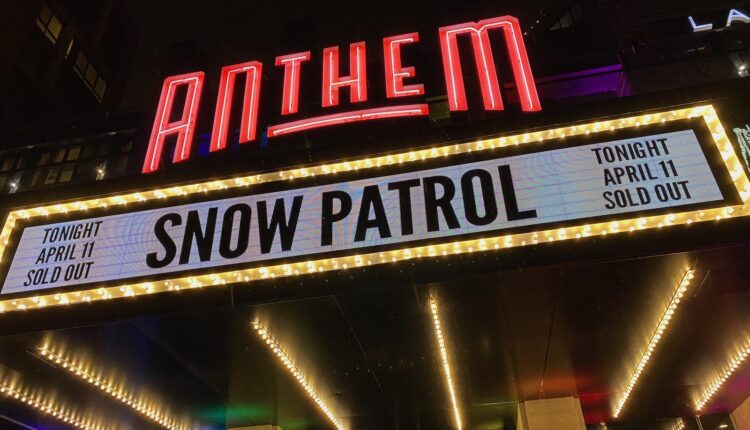Chris Gowen: Will the DC Council strengthen Ticketmaster’s monopoly?
If you’ve tried to buy tickets for popular events in DC lately, the odds are high that the event sold out in seconds and you were forced to purchase severely marked-up tickets from an online reseller.
On Wednesday, the DC Council will hold a public hearing on this very issue. Over 25 states have already introduced legislation to stop ticket scalping — and it’s time for DC to do the same.
To that end, Councilmembers Charles Allen, Brianne Nadeau, Kenyan McDuffie, Matthew Frumin, Christina Henderson, Janeese Lewis George, Robert White and Zachary Parker introduced legislation, B26-0224, to resolve this issue. Their bill is a step in the right direction, and their attention to this matter is very much appreciated; however, they need to modify their measure in one crucial way to avoid unintended consequences.
Whether you are trying to see Hamilton at the Kennedy Center, the Savannah Bananas at Nationals Park, or Goose at the Anthem, fans are seeing resale ticket markups as high as 7,000%, according to a recent White House executive order. That is pricing tens of thousands of residents entirely out of DC’s cultural life.

Performers and event organizers often try to prevent this kind of price-gouging, but there is only so much they can do when Live Nation — Ticketmaster’s parent company, which controls more than 80% of the primary ticketing market — has been accused of turning a blind eye to illegal ticket-buying bots. These automated computer programs allow ticket resellers to buy up the majority of Live Nation’s inventory within seconds of tickets going on sale.
Just last month, the Federal Trade Commission sued Live Nation for allegedly allowing these bots to exceed its ticket purchasing limits and inflating prices in violation of federal law. One broker, according to the complaint, used bots to purchase 9,000 tickets to one Beyoncé show and over 8,500 to a Travis Scott concert while Live Nation profited twice: first from the sale, and again from the resale of over 2,000 of those tickets on its own marketplace.
That FTC lawsuit, only the second federal enforcement action against bot scalping in nine years, underscores how little accountability exists on the federal level and why the DC Council must take action.
The council can close this enforcement gap inside the District’s borders by empowering the DC attorney general’s office to enforce the law locally, increasing penalties for repeat offenders, and requiring ticketing companies to disclose how many tickets actually reach people as opposed to software bots. B26-0224 addresses the bots in some crucial ways, which is great news for consumers.
It’s true that last year, DC Attorney General Brian Schwalb joined the U.S. Department of Justice and 39 states in suing Live Nation, alleging that the ticket giant used its monopoly power to overcharge fans and strong-arm venues into exclusive contracts. But that doesn’t mean the District should wait for the courts to act. Local action can protect consumers now.
At the same time, Live Nation is urging lawmakers nationwide to impose price caps, claiming it would help consumers. In reality, it would do the opposite — and unfortunately, the DC Council’s bill also includes language that will give Live Nation exactly this.
While ticketing comprises less than 15% of Live Nation’s revenue, it is nearly 100% of its competitors’ revenue. These much smaller companies do not have other business streams — unlike the industry’s dominant player, which also owns venues and promotes artists.
If a price cap drives Live Nation’s competitors out of business, ticket resales won’t disappear: They’ll just move onto Live Nation’s resale platform, with the remaining going to unsafe, unregulated websites or back to the scalpers on the streets outside of arenas, where there are no consumer protections. That would make things worse, not better.
A recent study found that more than half of the tickets sold on the online resale markets were sold below face value. Kill that competition, and that may no longer be the case as Live Nation will have more incentive to set prices at the legal maximum every time.
The better path forward is for the DC Council to crack down on the ticket purchasing bots while continuing to regulate the market to protect consumers from fraud and excessive fees. The market will correct itself naturally so long as there is a level playing field — but there will never be a level playing field if bots can continue purchasing Live Nation’s inventory within seconds.
Cracking down on the scalper-run bots may not sit well with the industry’s most dominant company — which, as I noted, controls 80% of primary ticketing — but that’s exactly why it’s the right approach.
Let’s all hope the DC Council chooses the side of fans, not monopolies, and acts soon.
Attorney Chris Gowen is an adjunct professor of law at American University Washington College of Law and University of Baltimore School of Law with a consumer protection research focus.



Comments are closed.